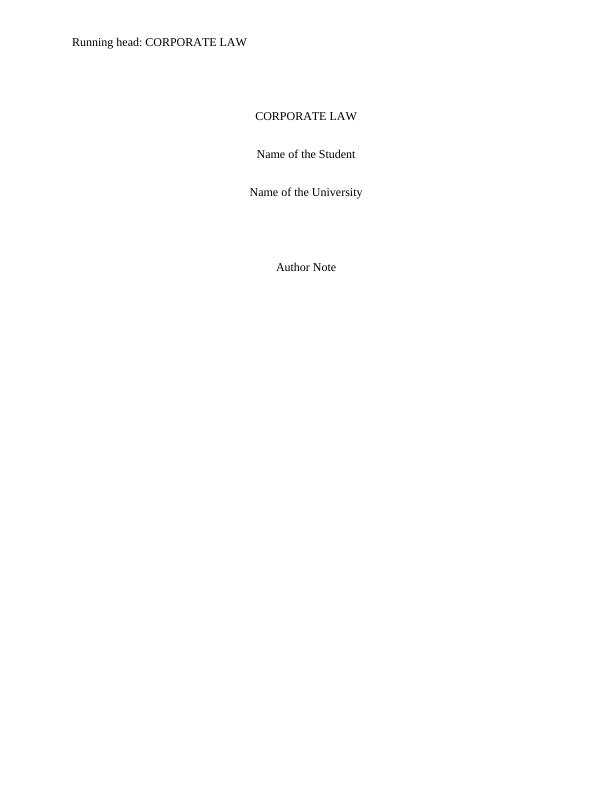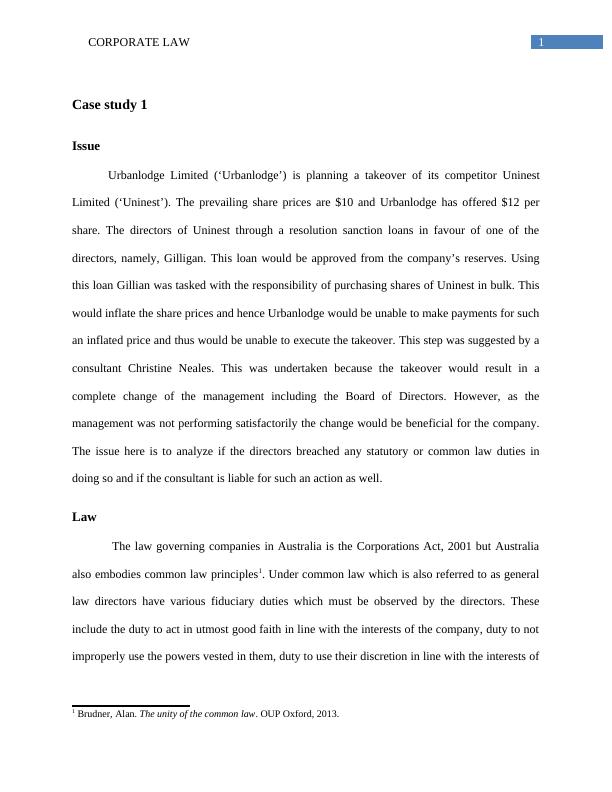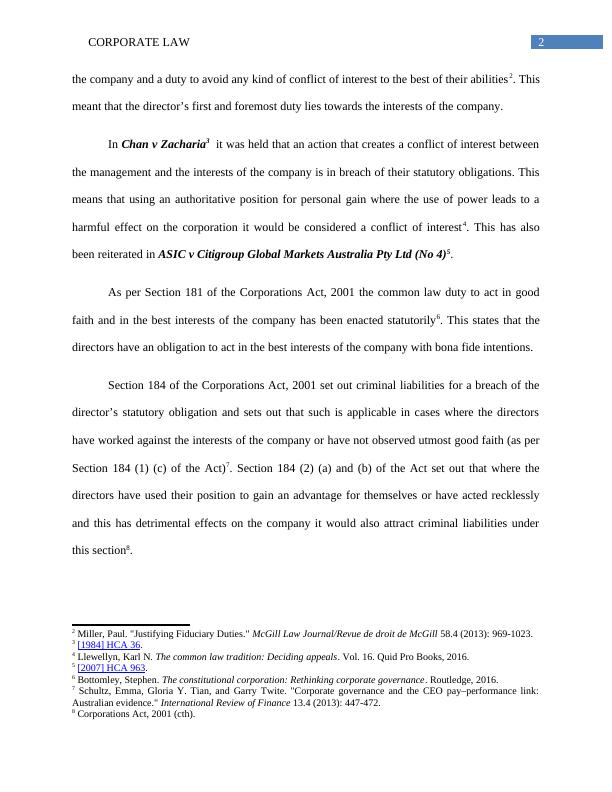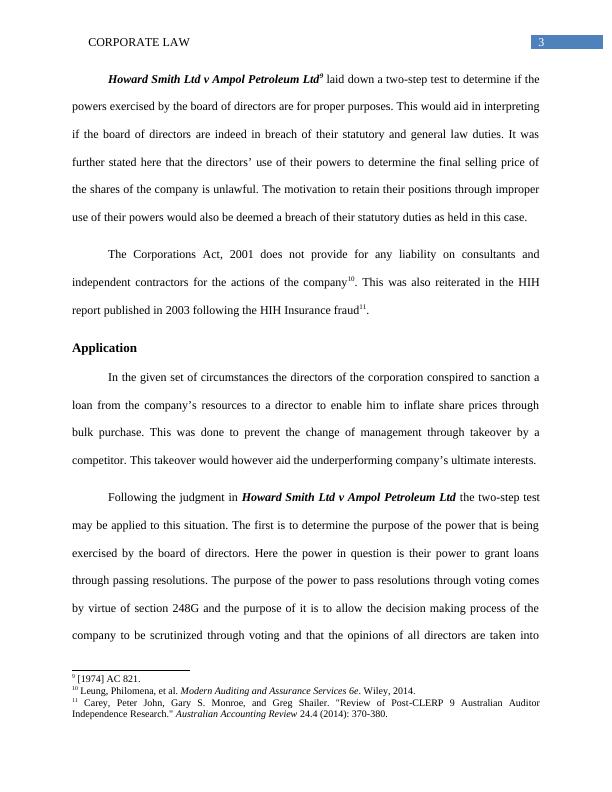Corporate Law Assignment : Uninest Limited
Added on 2021-04-24
13 Pages3072 Words2 Views
Running head: CORPORATE LAWCORPORATE LAWName of the StudentName of the UniversityAuthor Note

1CORPORATE LAWCase study 1IssueUrbanlodge Limited (‘Urbanlodge’) is planning a takeover of its competitor UninestLimited (‘Uninest’). The prevailing share prices are $10 and Urbanlodge has offered $12 pershare. The directors of Uninest through a resolution sanction loans in favour of one of thedirectors, namely, Gilligan. This loan would be approved from the company’s reserves. Usingthis loan Gillian was tasked with the responsibility of purchasing shares of Uninest in bulk. Thiswould inflate the share prices and hence Urbanlodge would be unable to make payments for suchan inflated price and thus would be unable to execute the takeover. This step was suggested by aconsultant Christine Neales. This was undertaken because the takeover would result in acomplete change of the management including the Board of Directors. However, as themanagement was not performing satisfactorily the change would be beneficial for the company.The issue here is to analyze if the directors breached any statutory or common law duties indoing so and if the consultant is liable for such an action as well.Law The law governing companies in Australia is the Corporations Act, 2001 but Australiaalso embodies common law principles1. Under common law which is also referred to as generallaw directors have various fiduciary duties which must be observed by the directors. Theseinclude the duty to act in utmost good faith in line with the interests of the company, duty to notimproperly use the powers vested in them, duty to use their discretion in line with the interests of1 Brudner, Alan.The unity of the common law. OUP Oxford, 2013.

2CORPORATE LAWthe company and a duty to avoid any kind of conflict of interest to the best of their abilities2. Thismeant that the director’s first and foremost duty lies towards the interests of the company. In Chan v Zacharia3 it was held that an action that creates a conflict of interest betweenthe management and the interests of the company is in breach of their statutory obligations. Thismeans that using an authoritative position for personal gain where the use of power leads to aharmful effect on the corporation it would be considered a conflict of interest4. This has alsobeen reiterated in ASIC v Citigroup Global Markets Australia Pty Ltd (No 4)5. As per Section 181 of the Corporations Act, 2001 the common law duty to act in goodfaith and in the best interests of the company has been enacted statutorily6. This states that thedirectors have an obligation to act in the best interests of the company with bona fide intentions.Section 184 of the Corporations Act, 2001 set out criminal liabilities for a breach of thedirector’s statutory obligation and sets out that such is applicable in cases where the directorshave worked against the interests of the company or have not observed utmost good faith (as perSection 184 (1) (c) of the Act)7. Section 184 (2) (a) and (b) of the Act set out that where thedirectors have used their position to gain an advantage for themselves or have acted recklesslyand this has detrimental effects on the company it would also attract criminal liabilities underthis section8.2 Miller, Paul. "Justifying Fiduciary Duties."McGill Law Journal/Revue de droit de McGill58.4 (2013): 969-1023.3[1984] HCA 36.4 Llewellyn, Karl N.The common law tradition: Deciding appeals. Vol. 16. Quid Pro Books, 2016.5[2007] HCA 963.6 Bottomley, Stephen.The constitutional corporation: Rethinking corporate governance. Routledge, 2016.7 Schultz, Emma, Gloria Y. Tian, and Garry Twite. "Corporate governance and the CEO pay–performance link:Australian evidence."International Review of Finance13.4 (2013): 447-472.8 Corporations Act, 2001 (cth).

3CORPORATE LAWHoward Smith Ltd v Ampol Petroleum Ltd9 laid down a two-step test to determine if thepowers exercised by the board of directors are for proper purposes. This would aid in interpretingif the board of directors are indeed in breach of their statutory and general law duties. It wasfurther stated here that the directors’ use of their powers to determine the final selling price ofthe shares of the company is unlawful. The motivation to retain their positions through improperuse of their powers would also be deemed a breach of their statutory duties as held in this case. The Corporations Act, 2001 does not provide for any liability on consultants andindependent contractors for the actions of the company10. This was also reiterated in the HIHreport published in 2003 following the HIH Insurance fraud11. ApplicationIn the given set of circumstances the directors of the corporation conspired to sanction aloan from the company’s resources to a director to enable him to inflate share prices throughbulk purchase. This was done to prevent the change of management through takeover by acompetitor. This takeover would however aid the underperforming company’s ultimate interests.Following the judgment in Howard Smith Ltd v Ampol Petroleum Ltd the two-step testmay be applied to this situation. The first is to determine the purpose of the power that is beingexercised by the board of directors. Here the power in question is their power to grant loansthrough passing resolutions. The purpose of the power to pass resolutions through voting comesby virtue of section 248G and the purpose of it is to allow the decision making process of thecompany to be scrutinized through voting and that the opinions of all directors are taken into9 [1974] AC 821.10 Leung, Philomena, et al.Modern Auditing and Assurance Services 6e. Wiley, 2014.11 Carey, Peter John, Gary S. Monroe, and Greg Shailer. "Review of Post‐CLERP 9 Australian AuditorIndependence Research."Australian Accounting Review24.4 (2014): 370-380.

End of preview
Want to access all the pages? Upload your documents or become a member.
Related Documents
Commercial Law Case Studies: Breach of Director's Dutieslg...
|9
|2938
|481
Corporate Lawlg...
|11
|3576
|220
Corporate Law Case Studieslg...
|13
|4047
|163
Case Study Corporate Law Assignmentlg...
|12
|3943
|463
BX3173:03 Strategic Entrepreneurshiplg...
|14
|3384
|150
Document on Business Law Assignmentlg...
|7
|1761
|222
